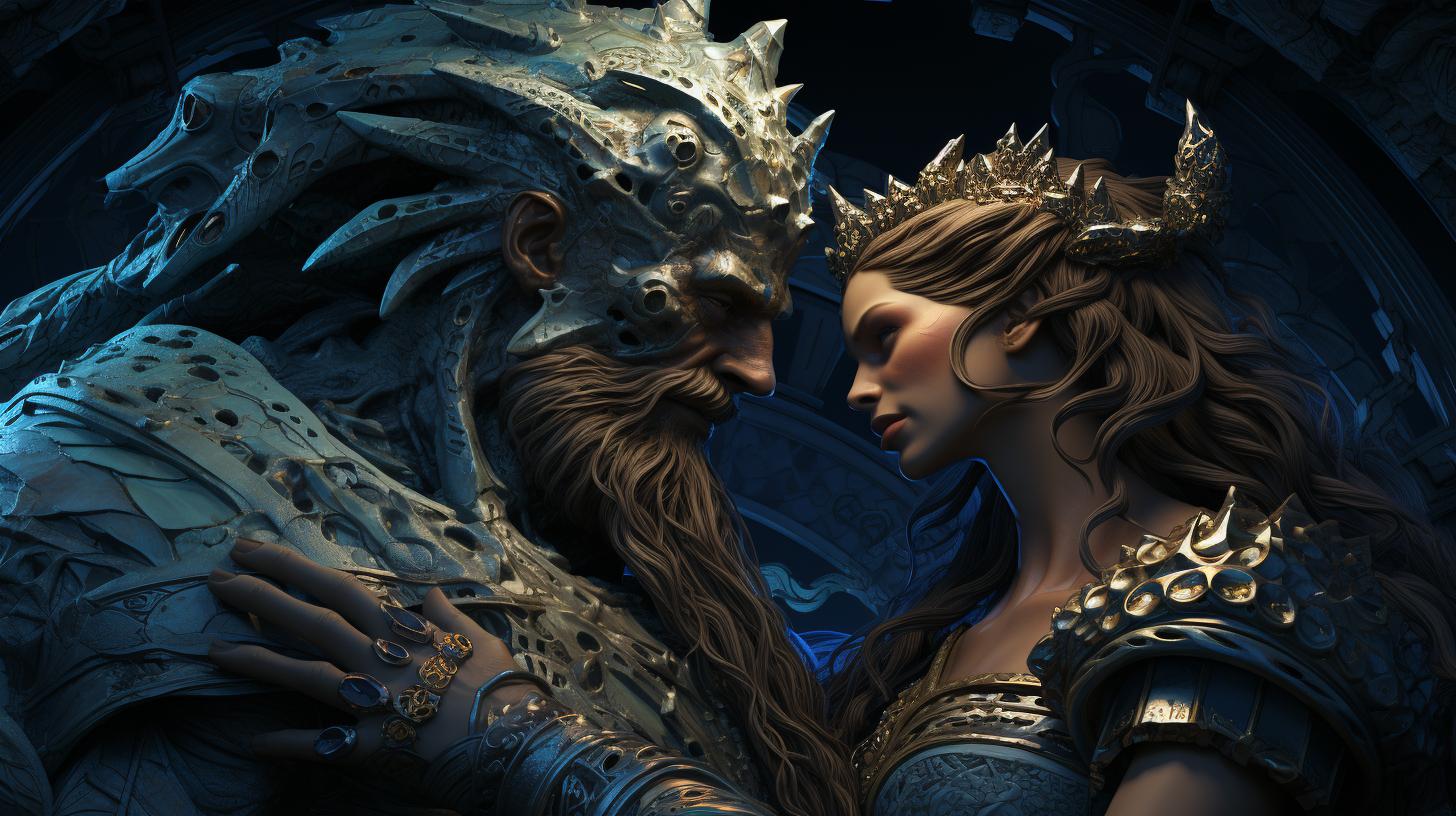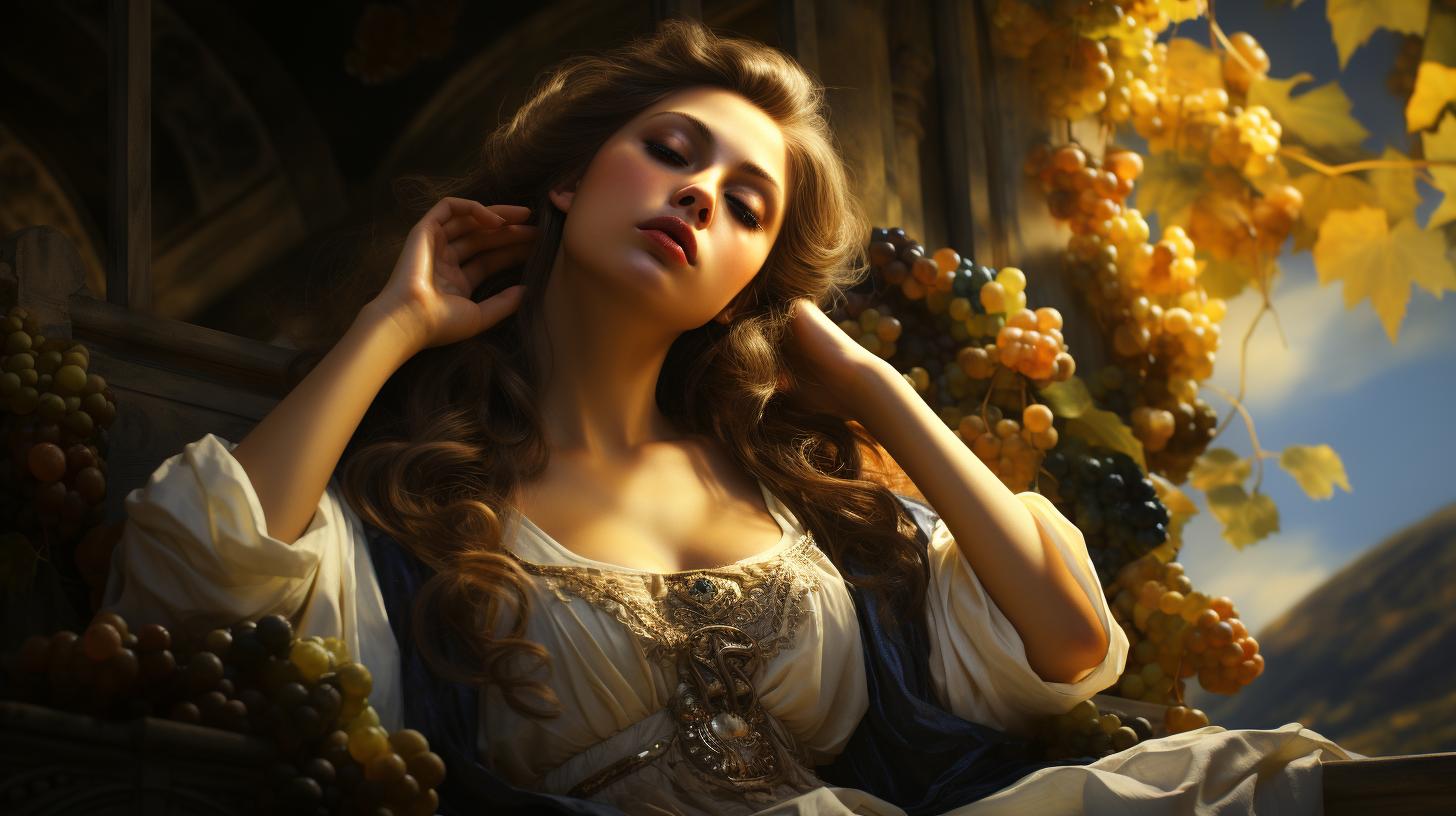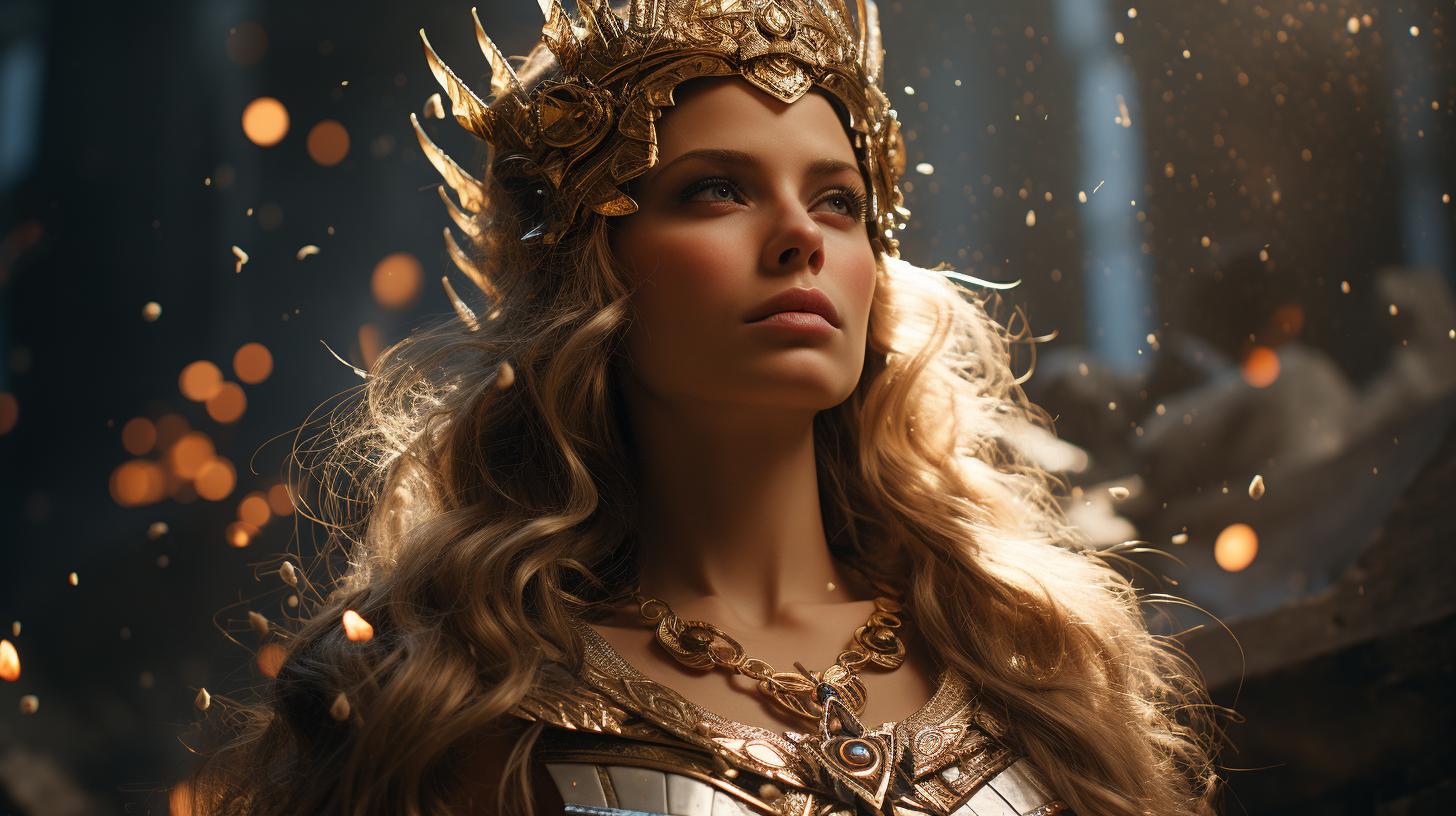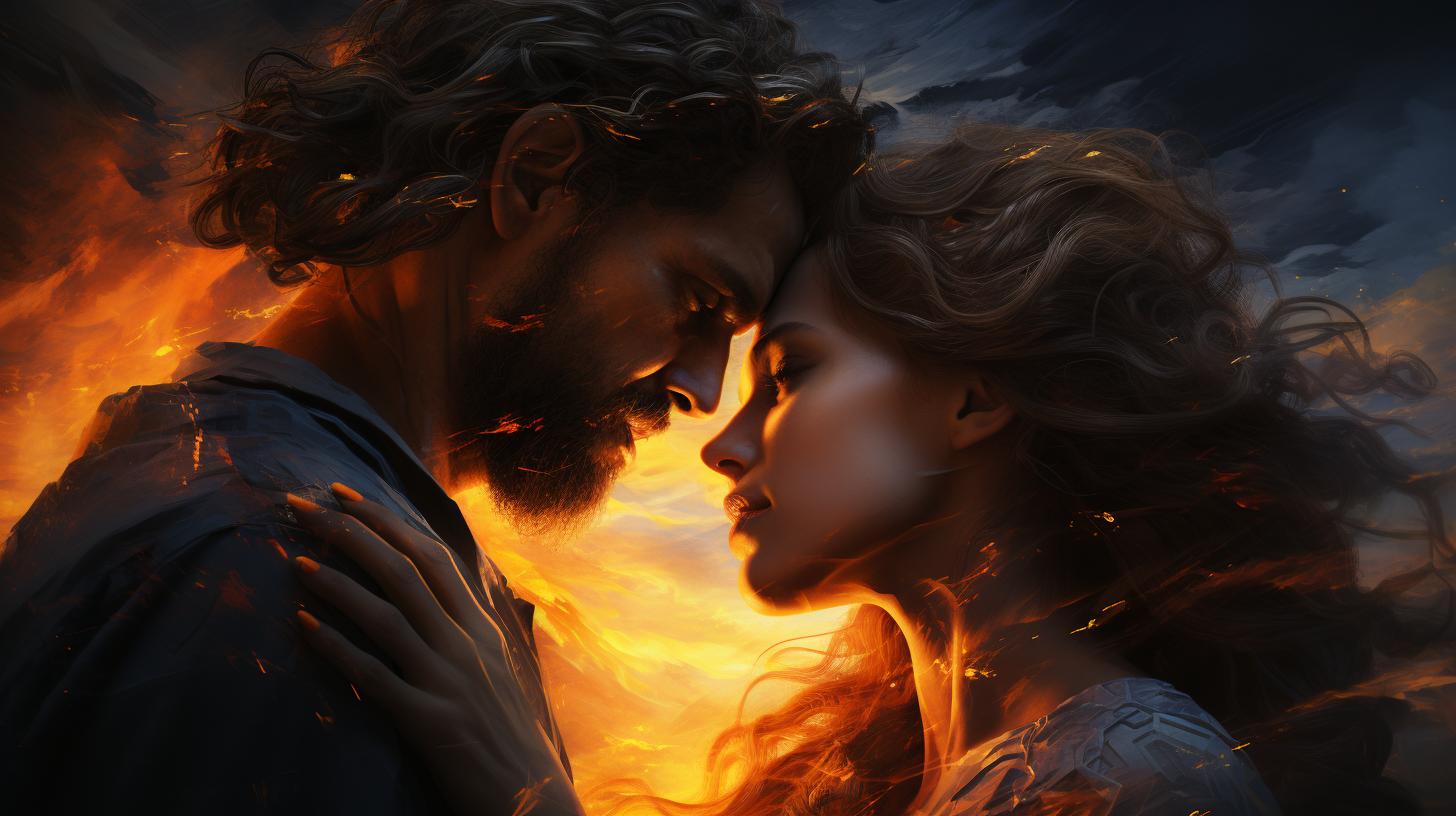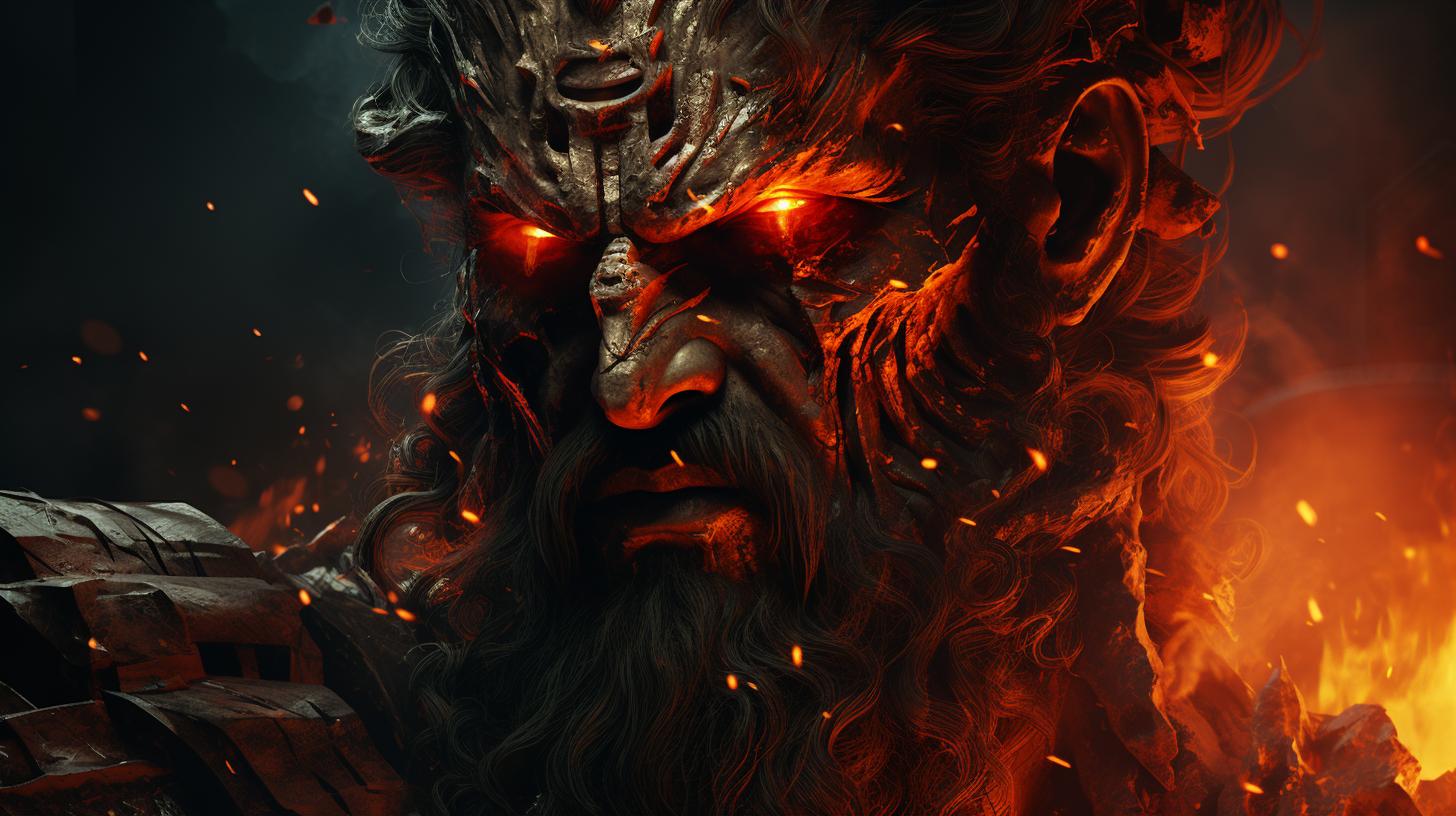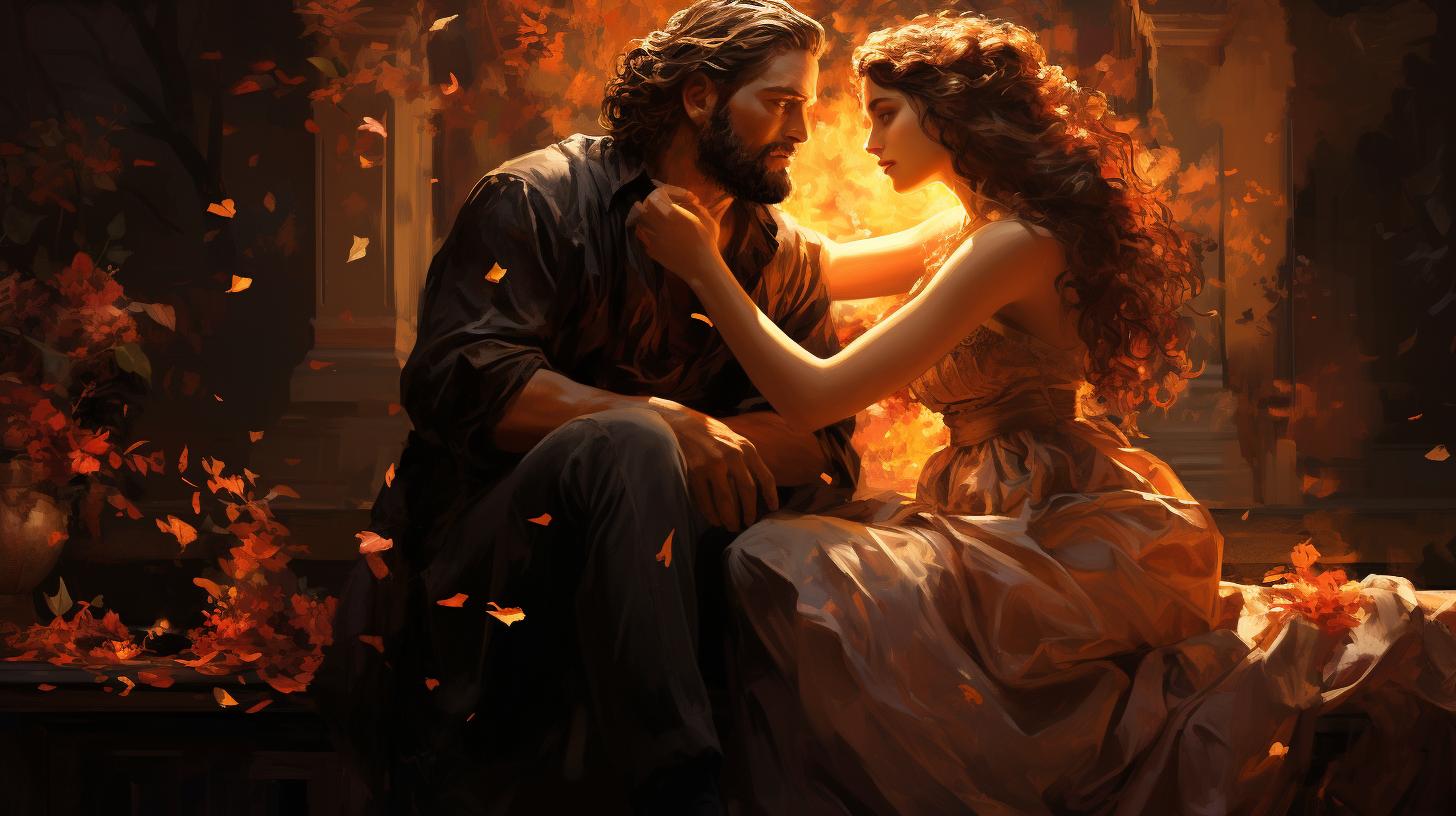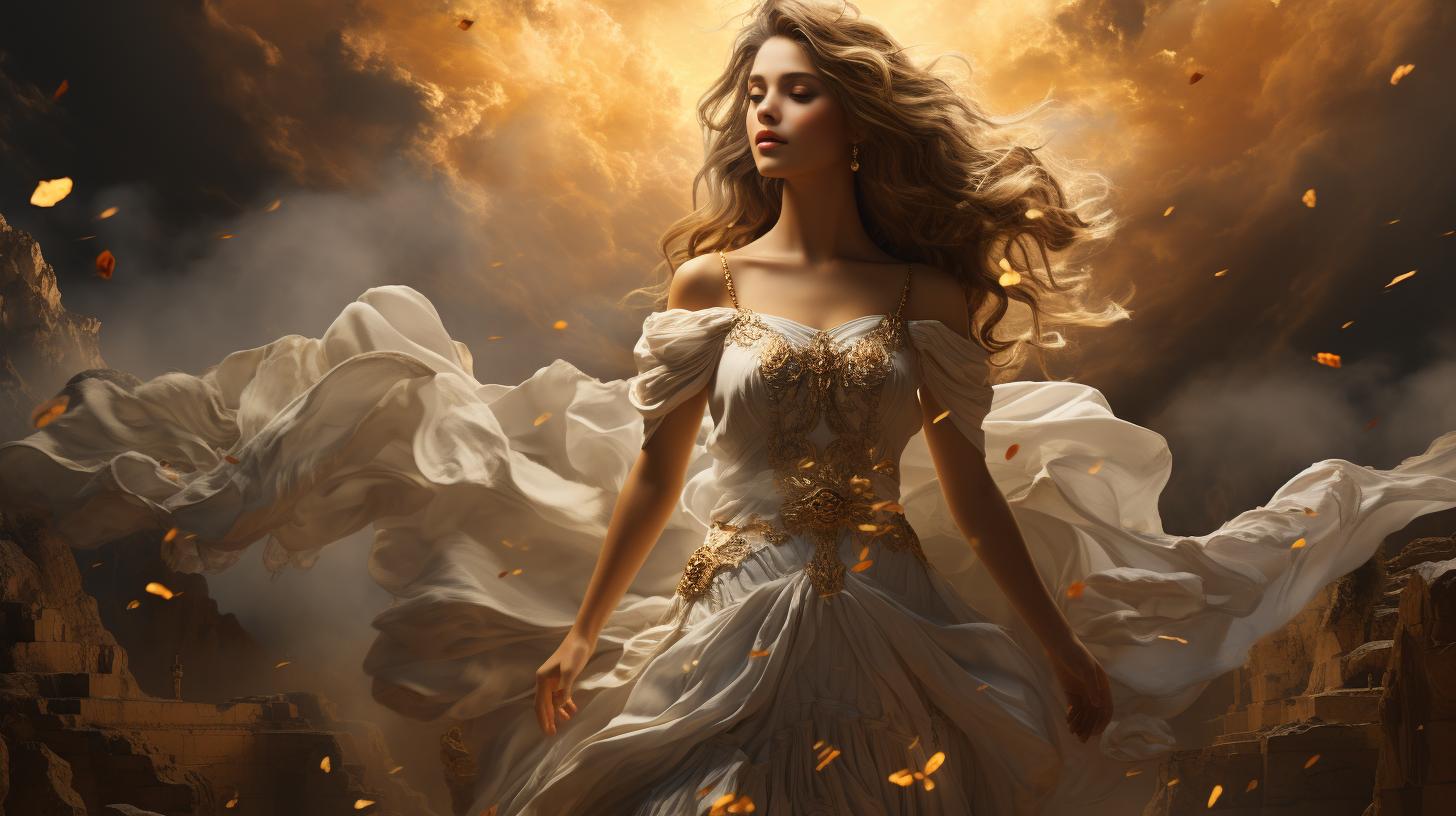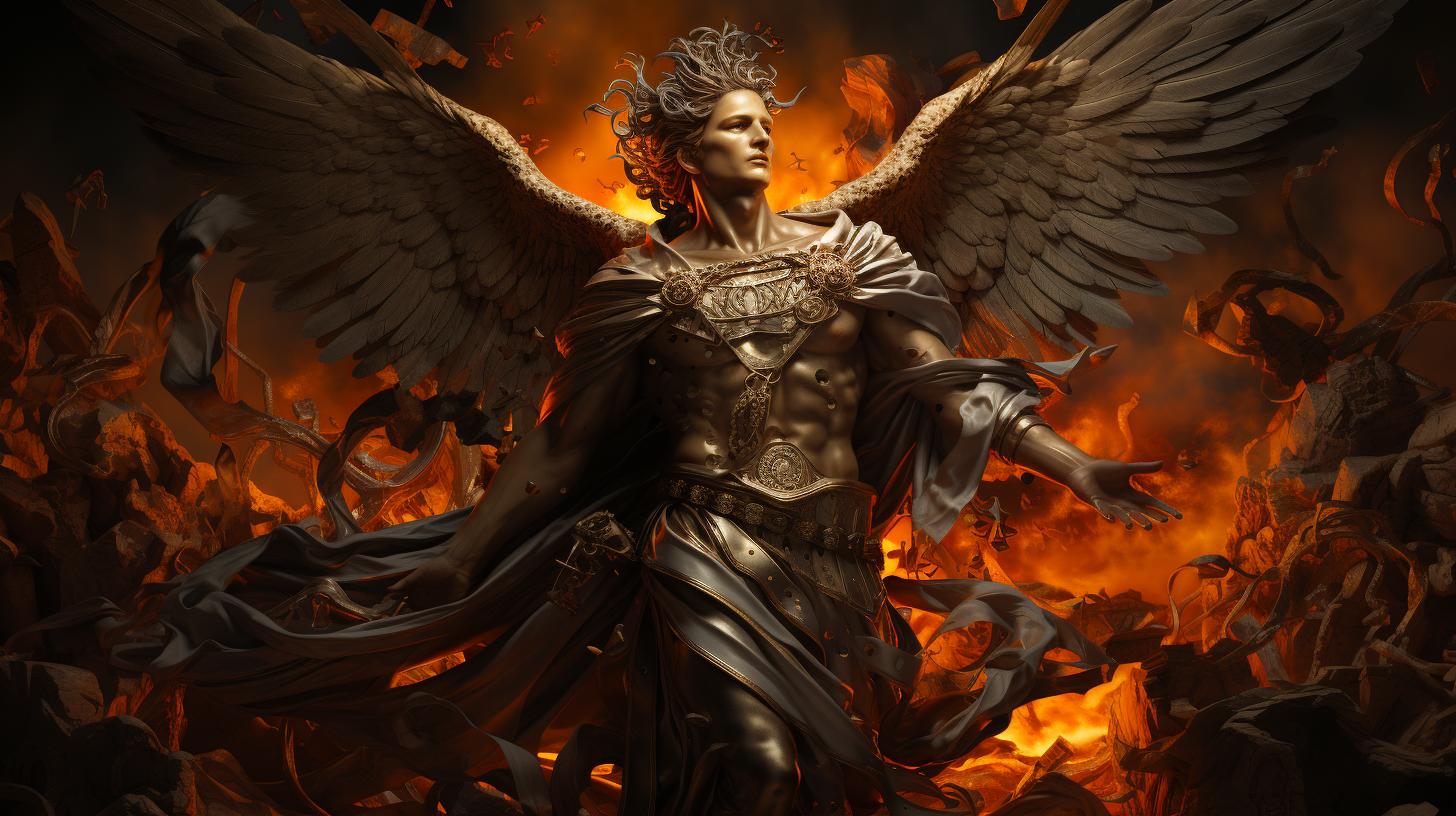Poseidon: The Mighty God of the Sea
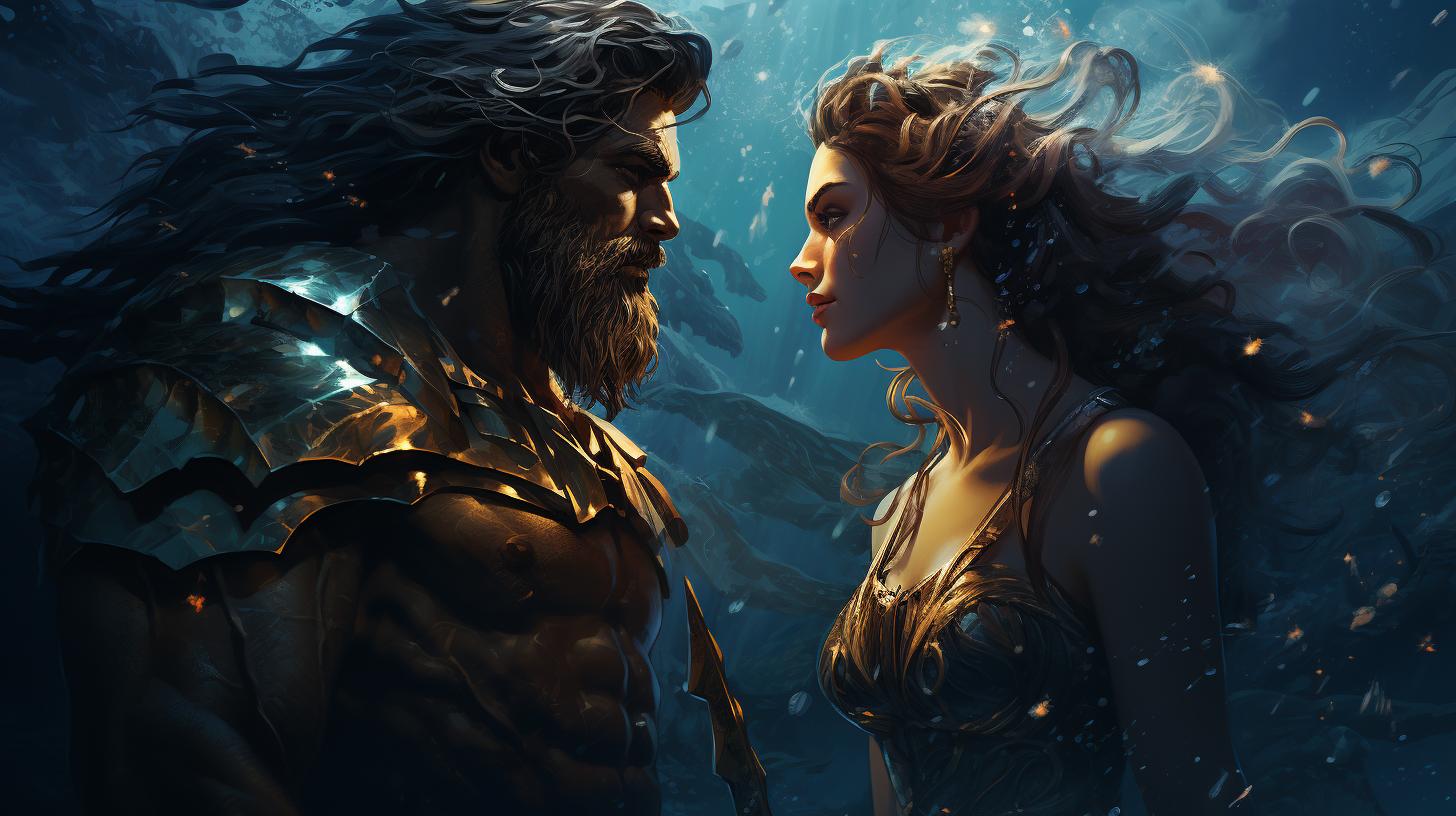
Greek Sea God Poseidon, a prominent figure in Greek mythology, reigns over the seas, earthquakes, storms, and horses. Born to Cronus and Rhea, he is the brother of Zeus, the supreme god of the sky, and Hades. Poseidon’s powerful trident, a symbol of his dominion over the sea and creator of earthquakes, showcases his immense powers and his role as the protector of sailors and seafarers.
He is also revered as the god of fertility and navigation, demonstrating his benevolence and influence on ancient and modern world alike.
Represented as a robust deity with a dark beard, Poseidon is often associated with marine animals such as bulls, horses, and dolphins. Engaging in contests with other gods, he had numerous offspring, including mythical creatures like Pegasus, showcasing the ancient origins of his legends.
Recognized as a primary deity in art, Poseidon’s festival, the Isthmia, is celebrated with great enthusiasm. Roman mythology equated him with Neptune, further solidifying his significance across cultures.
Overview of Greek Sea God Poseidon
Greek sea god Poseidon is a significant figure in Greek mythology, renowned for his dominion over the seas, earthquakes, storms, and horses.
As one of the twelve Olympian gods, Poseidon holds immense power and influence. His children, many of whom are prominent figures in Greek legends and myths, further extend his legacy.
He is the son of Cronus and Rhea, and the brother of Zeus, the sky god, and Hades.
Poseidon’s association with the sea stems from an epic battle between the Olympian gods and the Titans, where Poseidon played a vital role in overthrowing his father Cronus. As a result, he was awarded the realm of the sea as his domain, establishing his ancient origins and power amongst the titans and gods of Greek religion.
One of the most iconic symbols of Poseidon is his trident, a three-pronged weapon that symbolizes his control over the waters and ability to create earthquakes at will. This legendary weapon grants him immense power and instills fear in those who challenge his authority, demonstrating how Poseidon facts intertwine with his mythological stories.
Beyond his role as the god of the sea, Poseidon is also revered as the god of fertility and navigation. Sailors and seafarers relied on his favor for safe journeys and bountiful catches, illustrating how Poseidon influences the world today through his ancient lore.
Poseidon’s connection with fertility extended to land as well, where he was believed to have the power to bless the earth with abundant crops, showcasing his benevolence and versatility as a deity.
In art and mythology, Poseidon is typically depicted as a robust deity with a dark, flowing beard. He is often seen riding a chariot pulled by magnificent horses, emphasizing his association with equestrianism and his majestic presence.
Additionally, creatures such as bulls, horses, and dolphins are commonly linked to Poseidon, further solidifying his connection to the sea and marine life, and how his image is portrayed across Greek gods and mythology.
Poseidon’s influence extends beyond the realm of mythology and continues to captivate modern culture. His stories and legends, along with his symbolic representations, have inspired countless works of art, literature, and even movies, demonstrating how the Greek god Poseidon remains a significant figure in both ancient and contemporary discussions.
Origins and Family of Poseidon
Poseidon, the mighty Greek sea god, has a fascinating origin and family lineage in Greek mythology. As the son of Cronus and Rhea, Poseidon is born into the powerful Titan family, a testament to his ancient origins and significant power among the titans and Greek gods.
He is a sibling to Zeus, the king of gods and the sky god, and Hades, the ruler of the underworld.
When the Titans were overthrown by the younger generation of gods, Poseidon, along with his brothers, played a crucial role in the divine succession.
In the epic battle against the Titans, known as the Titanomachy, Poseidon fought alongside Zeus and the other gods, eventually emerging victorious.
As the god of the sea, Poseidon’s powers are deeply connected to his domain.
It is said that he gained control over the sea after successfully overthrowing his father, Cronus. From then on, he became the divine ruler of the sea, responsible for its vast waters, tempestuous storms, and unpredictable tides.
Poseidon’s family ties extend beyond his siblings, including Hades and Poseidon. He married Amphitrite, a Nereid and one of the fifty daughters of the sea god Nereus. Together, with his wife, they had many children, including Triton, a merman known for his conch shell trumpet, symbolizing his power over the sea Poseidon governed.
The union between Poseidon and Amphitrite also solidified his connection to the sea, further enhancing his stature as the god of the oceans, making him a key figure in ancient Greek religion.
Additionally, Poseidon had various love affairs throughout mythology, resulting in numerous offspring.
These included mighty heroes, such as Theseus and Pelops, as well as mythical creatures like the winged horse Pegasus, born from the blood of his decapitated Gorgon lover, Medusa. These tales are just a few of the fascinating facts about Poseidon, the Greek god of the sea who commanded the waters with his formidable trident.
The influence and power of Poseidon extended far and wide, shaping both the natural and mythical worlds.
His lineage, marked by divine parentage and significant familial connections, further solidifies his status as one of the most prominent and revered gods in Greek mythology.
Poseidon’s Powers and Domains
Poseidon, the Greek sea god, possesses immense powers and governs various domains, making him a formidable deity in Greek mythology.
Here are the key aspects of Poseidon’s powers and domains:
- Control over the Seas: Poseidon is primarily known as the ruler of the seas. He holds dominion over the vast ocean and all its creatures, with the ability to command the waves and create powerful storms.
- Earthquakes and Shaker of the Land: Apart from his control over the seas, Poseidon is also attributed with the power to cause earthquakes.
With a strike of his trident, he can shake the very foundations of the earth, causing the ground to tremble.
- Custodian of Horses: Poseidon is regarded as the god of horses and horsemanship.
He is often depicted riding a magnificent chariot pulled by mighty horses. His connection to horses signifies his influence over equestrian pursuits and the taming of these majestic animals.
- Protector of Navigators: As the god of the seas, Poseidon safeguards sailors and navigators during their voyages.
He is believed to have the power to provide bountiful harvests and ensure the growth of vegetation and crops.
With these powers and domains, Poseidon holds immense influence and commands respect among both gods and mortals.
His abilities to control the seas, cause earthquakes, govern horses, protect sailors, and bring fertility make him a significant deity in the Greek pantheon.
Deities and Creatures Associated with Poseidon
Poseidon, as the Greek sea god, is closely connected to various deities and creatures in Greek mythology.
These associations contribute to the rich and diverse nature attributed to Poseidon and his dominion over the seas. Here are some significant deities and creatures associated with Poseidon:
- Triton: Triton, son of Poseidon and Amphitrite, is a sea god and a herald of his father.
Often depicted as a merman, he is known for blowing a conch shell to calm or raise the waves.
- Amphitrite: Amphitrite, wife of Poseidon, is the queen of the sea.
She personifies the calmness and tranquility of the ocean and is often portrayed alongside Poseidon in his royal court.
- Nereus: Nereus is an ancient sea god, known for his wisdom and prophetic abilities.
He is often depicted as an older man with a long gray beard and a fish-like tail.
- Oceanus: Oceanus is the Titan god of the world-ocean, the river encircling the Earth.
He represents the vastness and primordial nature of the sea.
- Nereids: The Nereids are a group of fifty sea nymphs, daughters of Nereus and Doris. They are known for their beauty and association with marine life.
- Glaucus: Glaucus is a minor sea god who was once a mortal fisherman.
After consuming a magical herb, he transformed into a sea divinity and became an expert in prophecy and marine transformations.
- Scylla and Charybdis: Scylla and Charybdis are two monstrous sea creatures associated with Poseidon.
Scylla is depicted as a creature with multiple heads and tentacles, while Charybdis is a massive whirlpool.
These deities and creatures contribute to the intricate tapestry of Greek mythology surrounding Poseidon and his vast influence over the seas.
Their stories and interactions further highlight the complex nature of the Greek sea god in various mythological tales and legends.
Poseidon and Greek Mythology
Poseidon, the Greek god of the sea, holds a significant place in Greek mythology. Stories and tales involving Poseidon often revolve around his immense power and his interactions with both mortals and fellow gods, including his brothers Hades and Poseidon.
Let’s dive deeper into the intriguing mythology surrounding Poseidon:
Poseidon’s Role as a God
In Greek mythology, Poseidon was one of the twelve Olympian gods and ruled the domain of the sea. He commanded the waves, tides, and storms, and was revered for his ability to control the vast expanses of the ocean.
As the god of the sea, Poseidon played a vital role in the lives of sailors, fishermen, and those who ventured across the waters.
Mythical Encounters and Adventures
Poseidon’s involvement in various mythological tales showcases both his dominance and temperamental nature. One well-known story involves his contest with the goddess Athena over the patronage of the city of Athens.
In another tale, Poseidon was responsible for creating the magnificent horse, Pegasus, by striking the ground with his trident.
Conflicts and Rivalries
Poseidon’s relationship with other gods often led to conflicts and rivalries. His most famous dispute was with the god Zeus, his brother and king of the gods, over the control of the universe.
This ongoing rivalry between the two brothers added an intriguing dynamic to Greek mythology, with Poseidon’s wrath and vengeance being a recurring theme.
Symbolism and Depictions
Poseidon is commonly depicted as a powerful, bearded deity, often seen holding his iconic trident. The trident symbolizes Poseidon’s ability to create earthquakes and stir the seas. He is also associated with marine creatures such as bulls, horses, and dolphins.
These symbols reflect his dominion over the sea and highlight his connection to various aspects of maritime life.
Legacy and Influence
Even outside of Greek mythology, Poseidon’s influence can be observed in various aspects of modern culture. His depiction in art, literature, and films continues to captivate audiences, encapsulating the fascination that humans have with the vastness and power of the sea.
The portrayal of Poseidon in popular culture serves as a testament to his lasting legacy.
In conclusion, Poseidon’s role in Greek mythology as the god of the sea is rich with captivating stories, conflicts, and symbolism.
His power, presence, and tempestuous nature have left an indelible mark on ancient Greek culture and continue to inspire awe and intrigue in the present day.
Poseidon in Ancient Greece
The Influence of Poseidon in Ancient Greece
Poseidon, the Greek sea god, held immense significance in the ancient Greek civilization. As the ruler of the seas, his influence extended beyond mere mythology.
His association with the waters made him an integral part of the lives of ancient Greeks, especially those involved in maritime activities and coastal regions.
Protector of Sailors and Navigator’s Guide
Ancient Greek sailors and fishermen revered Poseidon as their protector, relying on his benevolence to ensure safe voyages and bountiful catches.
Poseidon was also regarded as the god who guided mariners through treacherous waters and helped them navigate safely to their destinations. Sailors frequently made offerings and prayers to him, seeking his favor before embarking on their journeys.
City Patron and the Gift of Water
In ancient Greece, Poseidon was not only revered as a sea deity but also held the role of a city patron. Many coastal cities and towns, such as Corinth and Athens, claimed him as their protector and benefactor.
As the god of water, Poseidon was often associated with the gift of freshwater springs. People believed that he could cause or prevent droughts and would offer sacrifices to appease him and ensure an abundant water supply.
Mythological
Tales and Legends
Poseidon, the god of the sea, demonstrates his power and benevolence in numerous mythological tales and legends of ancient Greece. His interactions with other gods, heroes, and the natural world often resulted in epic battles, rivalries, or alliances, showcasing Poseidon’s powers and his pivotal role in Greek mythology.
Poseidon, a central figure among the Olympians, resided on Mount Olympus alongside Zeus and other deities, influencing the world through his mastery over the oceans and aquatic life.
He is famously known for his rivalry with the goddess Athena for the patronage of Athens, which led to the competition between them to gift the city a valuable resource.
Poseidon struck the ground with his trident, creating a spring of saltwater, while Athena’s gift of an olive tree secured her victory, illustrating the gods’ involvement in the lives of the Greeks.
Importance in Greek Art and Sculpture
The portrayal of Poseidon in ancient Greek art and sculpture further exemplifies his significance. Artists depicted him with a strong build, a flowing beard, and holding his powerful trident – symbols of his dominion over the seas.
He was often shown riding a chariot pulled by magnificent horses or accompanied by marine animals such as dolphins, bulls, and fish. These representations captured his dominant presence and emphasized his connection with the sea, revealing what Poseidon, the god of the sea, looked like to the ancients.
In conclusion, Poseidon’s involvement in ancient Greek society went beyond being just a mythical figure. He played a crucial role as a protector, guide, and patron of sailors, leaving an indelible imprint on the culture, beliefs, and arts of the time.
His myths and legends continue to demonstrate his power and benevolence, influencing the world today through literature, art, and cultural expressions that trace back to the Greeks and their rich mythology.
Worship and Festivals of Poseidon
The worship of Poseidon, god of the sea, earthquakes, and horses, was an integral part of ancient Greek society, particularly for those who relied on the sea for their livelihoods. As the god of the sea, sailors, fishermen, and coastal communities held Poseidon in high regard and sought his blessings for safe voyages and abundant catches.
One of the most significant festivals dedicated to Poseidon was the Isthmian Games. Held every two years at the Isthmus of Corinth, this athletic and artistic competition attracted participants from all over Greece.
It was an opportunity for athletes to showcase their skills and pay homage to Poseidon, who was considered the patron deity of the games. The festivities included various sports events, including chariot races, wrestling, and a musical contest, celebrating the strength, skill, and artistry that were attributes of Poseidon’s followers.
Another prominent festival in honor of Poseidon was the Posidonia, celebrated in various coastal regions. During this event, people would gather to offer sacrifices to Poseidon and seek his favor for calm seas, bountiful harvests from the sea, and protection from storms.
Participants would engage in processions, feasts, and abundant merriment as they celebrated the power and benevolence of the sea god.
Temples and sanctuaries dedicated to Poseidon across Greece, with the most famous being the Temple of Poseidon at Cape Sounion, served as focal points for worship and symbols of the maritime strength and supremacy of the Greek civilization.
The house and temples of Poseidon were places where the Greeks could directly connect with their deity, seeking his protection and expressing their devotion through rituals and offerings.
The worship and festivals of Poseidon played a vital role in fostering a deep connection between the ancient Greeks and the untamed forces of the sea.
It was a way for communities to express their reverence, seek protection, and celebrate the abundant resources offered by the sea, which were attributed to the influence of Poseidon, showcasing how deeply the myths and the gods, especially Poseidon, were woven into the fabric of Greek life.
Poseidon’s Offspring and Descendants
Poseidon, the mighty Greek sea god, had numerous offspring and descendants, some of whom were monstrous creatures and mythical beings. These extraordinary beings were the result of Poseidon’s interactions with gods, mortal women, and even other creatures.
Let’s explore some of the notable offspring and descendants of Poseidon:
- Triton: Triton was one of Poseidon’s most famous sons. He was a merman, often depicted with the upper body of a man and the lower body of a fish.
Triton was known as the messenger of the sea, and he would often blow his conch shell trumpet to calm or raise the waves.
- Rhode: Rhode, also known as Rhodos, was the daughter of Poseidon and the nymph Halia.
She lent her name to the beautiful Greek island of Rhodes, which was said to have emerged from the sea as a gift from Poseidon to her.
- Polyphemus: Polyphemus was a cyclops and the son of Poseidon and the sea nymph Thoosa.
He was famous for his encounter with the hero Odysseus in Homer’s epic poem, the Odyssey.
- Theseus: Theseus, the legendary hero of Athens, was believed to be one of Poseidon’s sons.
Poseidon played a significant role in helping Theseus during his adventures, including providing him with a magical sword to defeat the Minotaur in the labyrinth.
- Orion: Although there are different versions of Orion’s parentage, some stories suggest that he was the son of Poseidon.
Orion was a giant hunter who became a constellation in the night sky after his death.
These are just a few examples of Poseidon’s offspring and descendants. As a powerful and influential deity, Poseidon’s lineage played a significant role in Greek mythology and the tales of gods and heroes.
Stories and Legends about Poseidon
Throughout Greek mythology, numerous stories and legends revolve around the mighty sea god Poseidon. These tales showcase his power, influence, and sometimes his turbulent relationships with both gods and mortals.
Battle for Athens: Poseidon vs Athena
One of the most famous stories involving Poseidon is the battle for the patronage of Athens between him and the goddess Athena. According to the legend, Poseidon struck his trident into the ground, creating a saltwater spring, while Athena offered an olive tree.
The inhabitants of Athens favored the gift of Athena, which led to her being chosen as the city’s patron deity.
The Creation of Horses
Another fascinating tale associated with Poseidon is the creation of horses. It is said that when Poseidon struck his trident on a rock, a magnificent horse emerged. These majestic creatures became his symbols and were highly prized in ancient Greece.
They were associated not only with Poseidon but also with speed, grace, and power.
The Wrath of Poseidon
Poseidon’s temperamental nature often led to his displays of anger and wrath. In the epic poem “The Odyssey,” Poseidon played a pivotal role in the protagonist Odysseus’ journey. Due to Odysseus blinding the Cyclops Polyphemus, who was Poseidon’s son, the sea god became the main obstacle for Odysseus in his struggle to return home.
The Lost City of Atlantis
One of the most mysterious and captivating tales associated with Poseidon is the legend of the lost city of Atlantis. It is believed that Poseidon was the patron of Atlantis, a powerful and advanced civilization that eventually became engulfed by the ocean, vanishing into the depths.
The myth of Atlantis continues to spark intrigue and fascination in both ancient and modern times.
These stories and legends surrounding Poseidon demonstrate his significant impact on Greek mythology and his influence in various aspects of life, from the creation of natural elements to the unpredictable forces of the sea.
Poseidon in Art and Literature
Poseidon, the mighty Greek sea god, has been a prominent figure in various forms of art and literature throughout history. Artists, writers, and poets have drawn inspiration from his powerful presence and captivating mythology.
Let’s explore how Poseidon has influenced art and literature over the years.
Depictions in Art
Artists from ancient times to the modern era have depicted Poseidon in various forms. In classical Greek art, he is often portrayed as a robust and bearded deity, holding his iconic trident.
These sculptures and paintings highlight his authority over the seas and his association with marine creatures, such as dolphins and horses.
During the Renaissance period, Poseidon continued to captivate artists. They represented him as a graceful and muscular figure, reflecting the era’s interest in human anatomy and idealized beauty.
Often depicted alongside other gods or in mythological scenes, these artworks showcased Poseidon’s power and domain over the seas.
Mythological Inspired Literature
Poseidon’s compelling mythology has inspired numerous writers and poets throughout the ages. From ancient Greek epic poems like Homer’s Odyssey to contemporary novels, his character and stories have been a rich source of inspiration.
In these literary works, Poseidon often takes on different roles. He appears as a formidable adversary, punishing arrogant mortals or challenging other gods. His conflicts with heroes and his involvement in maritime adventures provide captivating and dramatic narratives.
Authors continue to draw from Poseidon’s myths to explore themes such as the power of nature, human arrogance, and the consequences of challenging divine authority. His complex personality and unpredictable nature make for compelling and dynamic characters in literature.
Symbolic Representation
Poseidon’s symbols and representations have become widely recognized and utilized in various contexts. The trident, his most prominent attribute, has become a powerful symbol associated with the sea, power, and authority.
In modern culture, Poseidon’s imagery is often employed to convey strength, resilience, and the untamed force of nature. From logos to tattoos and creative artworks, his iconic presence endures as a symbol that resonates with people.
In conclusion, Poseidon’s influence on art and literature is undeniable. Through stunning depictions in art, inspiring mythological literature, and timeless symbolism, the Greek sea god continues to fascinate and captivate our imaginations in various forms of creative expression.
Symbols and Representations of Poseidon
Poseidon, the Greek sea god, is associated with various symbols and representations that convey his power and influence over the seas and marine life. These symbols have been depicted in ancient artwork and continue to be recognized in modern culture.
The Trident
One of the most distinctive symbols of Poseidon is his trident, a three-pronged spear-like weapon. The trident represents his authority and control over the seas, as well as his ability to stir up storms and create earthquakes.
It is often portrayed as a powerful tool that showcases his dominion over the watery realms.
Marine Animals
Poseidon is frequently depicted alongside marine animals, which serve as symbols of his connection to the sea. The most common of these animals include bulls, horses, and dolphins. Bulls represent strength and fertility, often highlighting Poseidon’s role as a god of both land and sea.
Horses symbolize his association with horseback riding and maritime trade. Dolphins, known for their intelligence and playfulness, embody the grace and agility often attributed to Poseidon.
The Sea
The vast expanse of the sea itself is a powerful symbol associated with Poseidon. It represents the unruly nature of the oceans and their potential for both great calm and devastating storms.
The sea signifies Poseidon’s realm, emphasizing his authority as the divine ruler of the watery depths and his ability to influence the fates of sailors and seafarers.
Tempests and Storms
Stormy weather and tempests are symbolic of Poseidon’s formidable nature. Thunderclouds, lightning, and crashing waves are often depicted in artwork to convey his role as a storm-bringer and the chaos he can unleash upon the seas.
These representations highlight his temperament and the potential dangers associated with crossing his path.
Artistic Depictions
Throughout history, Poseidon has been depicted in various artistic forms, including sculptures, paintings, and pottery. His robust physique, dark beard, and commanding presence are often depicted to portray his power and majesty.
Artists sought to capture his awe-inspiring image, sometimes even showcasing him riding a chariot pulled by horses or surrounded by sea creatures.
These symbols and representations not only pay homage to Poseidon’s significance in Greek mythology but also serve as visual reminders of his dominion over the oceans, storms, and all things related to the sea.
Poseidon in Modern Culture
Poseidon, the Greek sea god, continues to have a significant presence in modern culture. His legendary status and association with the sea have made him a captivating figure in various forms of art, literature, and entertainment.
Literature and Films
- Countless literary works draw inspiration from the stories and myths surrounding Poseidon. Writers often incorporate his character or references to him in novels, poetry, and plays.
- Hollywood has also explored Poseidon’s tales through films.
From epic adventures to fantasy movies, his presence can be found captivating audiences on the big screen.
Marine Exploration and Sports
- Poseidon’s affinity with the sea has influenced marine exploration and underwater sports. Diving enthusiasts often embrace his mythology and imagery.
- Water sports like surfing, sailing, and swimming frequently incorporate symbols associated with Poseidon, giving a nod to his maritime domain.
Art and Sculptures
- Artists across various mediums have been inspired by Poseidon’s formidable presence.
Paintings, sculptures, and statues often depict him in all his glory, capturing the essence of his power and strength.
- Architectural designs and landmarks pay homage to Poseidon, using elements like tridents and sea motifs as decorative features.
Pop Culture References
- Poseidon’s name and symbolism frequently appear in popular culture.
From brand names to sports team mascots, his legacy lives on as a representation of strength and authority.
- He continues to make appearances in video games, where players can interact with his character and delve into underwater-themed adventures.
In conclusion, the timeless allure of Poseidon in modern culture is a testament to the everlasting impact of Greek mythology.
Through literature, films, sports, art, and various other forms of entertainment, Poseidon remains an influential figure that continues to captivate and inspire people’s imagination even in the year 2023.
Frequently Asked Questions about Poseidon
Who is Poseidon?
Poseidon is a Greek sea god and one of the most powerful deities in Greek mythology.
He is known as the ruler of the seas, earthquakes, storms, and horses.
What are Poseidon’s family origins?
Poseidon is the son of Cronus and Rhea, making him the brother of Zeus and Hades. Together, they form the second generation of Olympian gods.
What powers and domains does Poseidon possess?
Poseidon’s main powers revolve around his control over the seas and the ability to cause earthquakes.
As the god of horses, he also has dominion over these majestic creatures.
Which deities and creatures are associated with Poseidon?
Poseidon is often depicted alongside marine animals such as bulls, horses, and dolphins. Additionally, he shares a connection with other Greek deities like Amphitrite, his wife and sea goddess.
What role does Poseidon play in Greek mythology?
Poseidon is involved in various myths and legends, including his dispute with Athena over the city of Athens.
He also plays a part in the creation of several mythical creatures and monsters.
How was Poseidon worshipped in ancient Greece?
Ancient Greeks worshipped Poseidon through various rituals and festivals. The Isthmia, a renowned festival dedicated to Poseidon, was held every two years near the Isthmus of Corinth.
Who are Poseidon’s offspring and descendants?
Poseidon has numerous children, including famous mythical beings like Pegasus, the winged horse.
He is also the ancestor of many heroes and kings, such as Theseus and Perseus.
Are there any notable stories or legends about Poseidon?
One of the most famous stories involving Poseidon is the myth of the creation of the horse. According to the legend, Poseidon created the first horse by striking his trident on the ground.
How is Poseidon represented in art and literature?
Poseidon is often depicted as a powerful and muscular deity with a dark beard. He typically carries his trident and is surrounded by waves or other water symbols in art.
What symbols and representations are associated with Poseidon?
Aside from his trident, Poseidon is frequently associated with sea creatures like dolphins and horses.
His symbol, the trident, is a powerful emblem often used to signify his presence.
How does Poseidon influence modern culture?
Poseidon’s influence can be seen in various aspects of contemporary culture, including literature, film, and even in the naming of naval vessels or seafood restaurants.
Is Poseidon still worshipped today?
While Poseidon is not actively worshipped as he was in ancient times, his mythology and imagery continue to captivate and inspire people around the world.
Where can I find more information about Poseidon?
You can find more detailed information about Poseidon in books on Greek mythology, online resources, and museum exhibits featuring ancient Greek artifacts and artwork.
.
.











